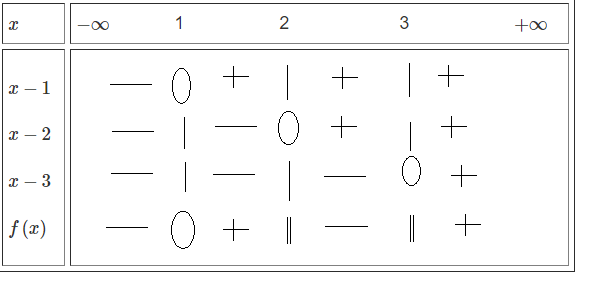Tập nghiệm của bất phương trình \(\dfrac{1}{x}>2\) là:
A. \(\left(-\infty;\dfrac{1}{2}\right)\)
B. \(\left(0;+\infty\right)\)
C. \(\left(0;\dfrac{1}{2}\right)\)
D. \(\left(-\infty;0\right)\cup\left(\dfrac{1}{2};+\infty\right)\)
Tập nghiệm của bất phương trình \(\dfrac{\text{x}-1}{\left(x-2\right)\left(x-3\right)}>0\) là:
A. \(\left(-\infty;1\right)\cup\left(3;+\infty\right)\) B. \(\left(1;2\right)\cup\left(3;+\infty\right)\)
C. \(\left(-\infty;1\right)\cup\left(2;3\right)\) D. \(\left(2;3\right)\)
Đặt \(f\left(x\right)=\dfrac{x-1}{\left(x-2\right)\left(x-3\right)}.\)
\(x-1=0.\Leftrightarrow x=1.\\ x-2=0.\Leftrightarrow x=2.\\ x-3=0.\Leftrightarrow x=3.\)

\(\Rightarrow f\left(x\right)>0\Leftrightarrow x\in\) \(\left(1;2\right)\cup\left(3;+\infty\right).\)
\(\Rightarrow B.\)
Tập nghiệm của bất phương trình \({(0,2)^x} > 1\) là:
A. \(\left( { - \infty ;2} \right)\)
B. \(\left( {0,2; + \infty } \right)\)
C. \(\left( {0; + \infty } \right)\)
D. \(\left( { - \infty ;0} \right)\)
Tập nghiệm của bất phương trình \({\log _{\frac{1}{4}}}x > - 2\) là:
A. \(\left( { - \infty ;16} \right)\)
B. \(\left( {16; + \infty } \right)\)
C. \((0;16)\)
D. \(\left( { - \infty ;0} \right)\)
\(\log_{\dfrac{1}{4}}x>-2\\ \Rightarrow\left\{{}\begin{matrix}x>0\\\log_{\dfrac{1}{4}}x>\log_{\dfrac{1}{4}}16\end{matrix}\right.\\ \Leftrightarrow\left\{{}\begin{matrix}x>0\\x< 16\end{matrix}\right.\\ \Leftrightarrow0< x< 16\)
Chọn C.
Tập nghiệm của bất phương trình \(\left|x+1\right|\)<x là:
A. \(S=\left(\dfrac{1}{2};+\infty\right)\) B. \(S=\left(0;\dfrac{1}{2}\right)\) C. \(S=\varnothing\) D. \(S=\left(-\infty;-\dfrac{1}{2}\right)\)
Tập nghiệm của bất phương trình \(0,{5^{3{\rm{x}} - 1}} > 0,25\) là
A. \(\left( { - \infty ;1} \right)\).
B. \(\left( {1; + \infty } \right)\).
C. \(\left( {0;1} \right)\).
D. \(\left( { - \infty ; - \frac{1}{3}} \right)\).
\(0,5^{3x-1}>0,25\)
\(\Leftrightarrow0,5^{3x-1}>0,5^2\)
\(\Leftrightarrow3x-1< 2\)
\(\Leftrightarrow3x< 3\)
\(\Leftrightarrow x< \dfrac{3}{3}\)
\(\Leftrightarrow x< 1\)
Vậy: \(\left(-\infty;1\right)\)
Chọn A
Tập nghiệm S của bất phương trình \(3\left(x^2-4x\right)-\left|x-2\right|>12\) có dạng \(S=\left(-\infty;a\right)\cup\left(b;+\infty\right)\). Tính giá trị \(P=a^2+b^2\)
( Nhờ mọi người giúp nha ! )
3x2 - 12x - |x - 2| > 12
⇔ \(\left[{}\begin{matrix}\left\{{}\begin{matrix}x\ge2\\3x^2-12x-\left(x-2\right)>12\end{matrix}\right.\\\left\{{}\begin{matrix}x< 2\\3x^2-12x-\left(2-x\right)>12\end{matrix}\right.\end{matrix}\right.\)
⇔ \(\left[{}\begin{matrix}\left\{{}\begin{matrix}x\ge2\\3x^2-12x-x+2>12\end{matrix}\right.\\\left\{{}\begin{matrix}x< 2\\3x^2-12x+x-2>12\end{matrix}\right.\end{matrix}\right.\)
⇔ \(\left[{}\begin{matrix}x>5\\x< -1\end{matrix}\right.\)
Vậy tập nghiệm là \(S=\left(-\infty;-1\right)\cup\left(5;+\infty\right)\)
\(\Leftrightarrow\left[{}\begin{matrix}\left\{{}\begin{matrix}x\ge2\\3\left(x^2-4x\right)-\left(x-2\right)>12\end{matrix}\right.\\\left\{{}\begin{matrix}x< 2\\3\left(x^2-4x\right)-\left(2-x\right)>12\end{matrix}\right.\end{matrix}\right.\)
\(\Leftrightarrow\left[{}\begin{matrix}\left\{{}\begin{matrix}x\ge2\\3x^2-13x-10>0\end{matrix}\right.\\\left\{{}\begin{matrix}x< 2\\3x^2-11x-14>0\end{matrix}\right.\end{matrix}\right.\) \(\Leftrightarrow\left[{}\begin{matrix}x>5\\x< -1\end{matrix}\right.\)
\(\Rightarrow\left\{{}\begin{matrix}a=-1\\b=5\end{matrix}\right.\)
Cho bất phương trình: \(\left(2m-1\right)x^3+\left(3-3m\right)x^2+\left(m-4\right)x+2\ge0\)
Tìm m để tập nghiệm chứa \(\left(0;+\infty\right)\)
- Với \(m=\dfrac{1}{2}\) ko thỏa mãn
- Với \(m\ne\dfrac{1}{2}\)
\(\Leftrightarrow\left(2m-1\right)x^3-\left(2m-1\right)x^2-\left(m-2\right)x^2+\left(m-4\right)x+2\ge0\)
\(\Leftrightarrow\left(2m-1\right)x^2\left(x-1\right)-\left(x-1\right)\left[\left(m-2\right)x+2\right]\ge0\)
\(\Leftrightarrow\left(x-1\right)\left[\left(2m-1\right)x^2-\left(m-2\right)x-2\right]\ge0\) (1)
Do (1) luôn chứa 1 nghiệm \(x=1\in\left(0;+\infty\right)\) nên để bài toán thỏa mãn thì cần 2 điều sau đồng thời xảy ra:
+/ \(2m-1>0\Rightarrow m>\dfrac{1}{2}\)
+/ \(\left(2m-1\right)x^2-\left(m-2\right)x-2=0\) có 2 nghiệm trong đó \(x_1\le0\) và \(x_2=1\)
Thay \(x=1\) vào ta được:
\(\left(2m-1\right)-\left(m-2\right)-2=0\Leftrightarrow m=1\)
Khi đó: \(x^2+x-2=0\) có 2 nghiệm \(\left[{}\begin{matrix}x_1=-2< 0\left(thỏa\right)\\x_2=1\end{matrix}\right.\)
Vậy \(m=1\)
tập nghiệm của bất phương trình -\(\dfrac{1}{2}\)x+6<0 là:
A. x>12 B. x>-3 C. x≥-12 D. x<3
giải chi tiết giúp mik nha.
\(-\dfrac{1}{2}x+6< 0\Leftrightarrow-\dfrac{1}{2}x< -6\Leftrightarrow\cdot\dfrac{1}{2}x>6\Leftrightarrow x>12\)
(sai thì thoi nha)
\(-\dfrac{1}{2}x+6< 0\)
\(\Leftrightarrow-\dfrac{1}{2}x< -6\)
\(\Leftrightarrow x>\left(-6\right):\left(-\dfrac{1}{2}\right)\)
\(\Leftrightarrow x>12\)
--> Chọn A
Câu 1: Giải và biện luận bất phương trình \(m^2x+m\ge2-4x\)
Câu 2: Tìm giá trị thực của tham số m để bất phương trình \(m\left(2x-1\right)\ge2x-1\) có tập nghiệm là \([1;+\infty)\)
1.
\(\Leftrightarrow\left(m^2+4\right)x\ge2-m\)
Do \(m^2+4>0\) ; \(\forall m\)
\(\Rightarrow x\ge\dfrac{2-m}{m^2+4}\)
2.
\(\Leftrightarrow2mx-2x\ge m-1\Leftrightarrow2\left(m-1\right)x\ge m-1\)
- Với \(m>1\Rightarrow m-1>0\)
\(\Rightarrow x\ge\dfrac{m-1}{2\left(m-1\right)}\Leftrightarrow x\ge\dfrac{1}{2}\) \(\Rightarrow D=[\dfrac{1}{2};+\infty)\)
- Với \(m< 1\Rightarrow m-1< 0\Rightarrow x\le\dfrac{m-1}{2\left(m-1\right)}\Leftrightarrow x\le\dfrac{1}{2}\) \(\Rightarrow D=(-\infty;\dfrac{1}{2}]\)
- Với \(m=1\Leftrightarrow0\ge0\Rightarrow D=R\)
Quan sát 3 TH ta thấy không tồn tại m để tập nghiệm của BPT là \([1;+\infty)\)
Tập nghiệm của bất phương trình \(\dfrac{2x\left(x^2-1\right)}{3-2x-x^2}\le0\) là
Tập nghiệm của BPT là: \(\left[{}\begin{matrix}-3< x\le-1\\0\le x< 1\\x>1\end{matrix}\right.\)